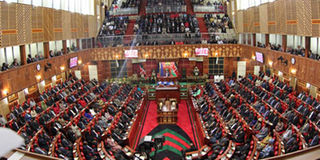Court declines to stop Anglo-Leasing payments

The National Assembly chambers. The pain of increased land taxes has seen residents of some counties voice their displeasure through demonstrations. PHOTO/FILE
Taxpayers are at risk of paying Sh1.4 billion to ghost Anglo-Leasing companies after the High Court declined to stop the Government from making the payments.
Justice David Majanja instead threw the burden to Parliament, ruling that the matter is before the National Assembly and that stopping Finance Cabinet Secretary Henry Rotich from making the payments will be interfering with MPs oversight roles in checking the government’s financial expenditure.
“The petitioner has alleged corruption in the Anglo-Leasing payment which this court takes seriously but which does not amount to interference with Parliament’s duties. In any event, they have not annexed any document to suggest the government will make the payments immediately,” ruled Majanja.
He added that the Law Society of Kenya, who filed the petition, had not demonstrated how they will suffer prejudice if the Government was not stopped from making the payments.
“It was the burden of LSK to demonstrate that they are entitled to the conservatory orders and although they have an arguable case, they have not even attached the judgment from England which compelled the government to pay the money,” ruled Majanja.
LSK through lawyer James Mwamu had sought to temporarily stop the government from paying the money to the ghost companies pending the determination of their petition.
Mr Mwamu argued that taxpayers stood to lose Sh1.4 billion to ghost companies since the judgment in England compelling the government to make the payments was an infringement to the rights of Kenyans.
“A foreign judgment that violates the rights of Kenyans cannot be sustained since the government seems to be in a hurry to execute the huge payments to a company that does not exist,” said Mwamu.
He added that the controversial contract with Anglo-Leasing companies was still a subject of investigations by the Ethics and Anti-Corruption Commission and if the payments are made, the commission might not be able to reach to the bottom of the matter.
However, Attorney General Prof Githu Muigai through senior deputy solicitor-general Muthoni Kimani defended the government move to make the payments saying that the allegations of corruption are rumours and misinformation being fuelled by people having a particular agenda.
“If there is one Kenyan out there who can come to prove to us that the Anglo-Leasing scheme is a fraud then we will be the first people to seek a court injunction to stop the payments. The contract was dealt with in accordance with the English law and our part has been to execute it in accordance with the constitution,” said Ms Muthoni.
Ms Muthoni added that the government would have opted to settle the Sh1.4 billion secretly but because of the public interest and the spirit of accountability, they have decided to involve Parliament which will have the final say on the payments.
Justice Majanja agreed with her submissions that the courts need to respect the doctrine of separation of powers and leave the controversy to be sorted by the executive and the legislature.
LSK went to court claiming that the payment would be a breach of the Constitution and against the will of Kenyans since the judgment giving rise to the dispute was untenable and based on questionable grounds.
According to LSK, the company that is being paid was not allowed to do transactions of such big amounts, yet the government had committed to pay.
The disputed judgment arose after an application by Universal Satspace (North America) LLC in September 2006 against the Kenya government over claims of $12,366,816 (Sh1.4 billion) at the Justice Queen’s Bench Division Commercial Court in England.
Justice Majanja scheduled May 26 for hearing LSK’s petition challenging the judgment.





